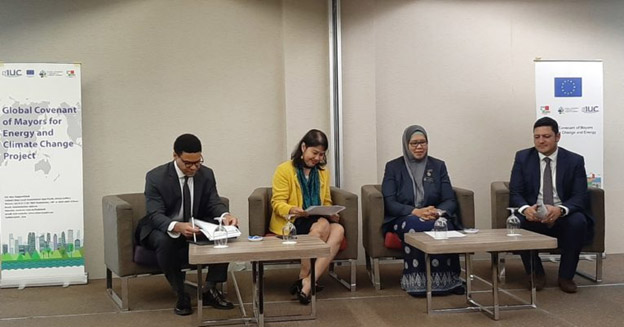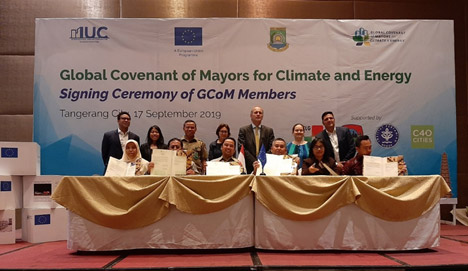16-17 September 2019 | TANGERANG – Serving as Secretariat for the Global Covenant of Mayors for Climate and Energy (GCOM) in Southeast Asia, UCLG ASPAC is glad to welcome on board six more Indonesian cities; Tangerang, Makassar, Denpasar, Malang, Palembang, and Depok, that have signed their commitment to join the network for better urban resilience. The signing ceremony took place at the Forum on “Climate Mitigation and Adaptation towards City Resilience.” The event was organised under the framework of the International Urban Cooperation Asia Programme (IUC), with the support of the European Union (EU) and hosted by the City of Tangerang, Indonesia.
The event was highlighted by the signing ceremony of six cities: Tangerang, Makassar, Denpasar, Malang, Palembang, and Depok, marking these cities’ commitment to leverage their actions to achieve the shared goal of better urban resilience. In the case of Tangerang, commitment signing gives Tangerang an opportunity to join GCoM Community, with a long-term vision of promoting and supporting voluntary actions to combat climate change, low-carbon society and climate resilient future. Tangerang will develop a community-scale greenhouse gas (GHG) emission inventory, an assessment of climate hazards and vulnerabilities, while improving an access to sustainable energy and setting ambitious, measurable and time-bound target to reduce and/or limit greenhouse gas emissions. For Makassar, Denpasar, Malang, Palembang and Depok, the commitment signing marked the beginning of their works as pilot cities that will receive IUC’s as well as other technical partners’ support in developing comprehensive action plans.
Financing the Climate Actions

14-15 October 2019 | SEBERANG PERAI, PENANG – UCLG ASPAC, through the support provided by IUC Asia Programme, organised a training on climate financing in Seberang Perai and Penang in conjunction with the 7th Asia-Pacific Urban Forum (APUF7). Attending the training activity were thirty-four participants from fourteen Malaysian cities.
The training session involved reputable resource persons from international and national institutions including the EU’s Foreign Policy Instrument (FPI), the Joint Research Centre of European Commission (JRC), UN Habitat, Green Climate Fund (GCF) and Malaysian public and private institutions. Enriched with interactive dialogues, the session presented best practices on financing for cities in Asia, creating revenue stream from climate action, cycle of investment, private sector involvement and green technology financing scheme. In addition, this training session featured a group activity to strengthen the participants’ knowledge and understanding on how to develop a financing proposal for city climate action plan.











